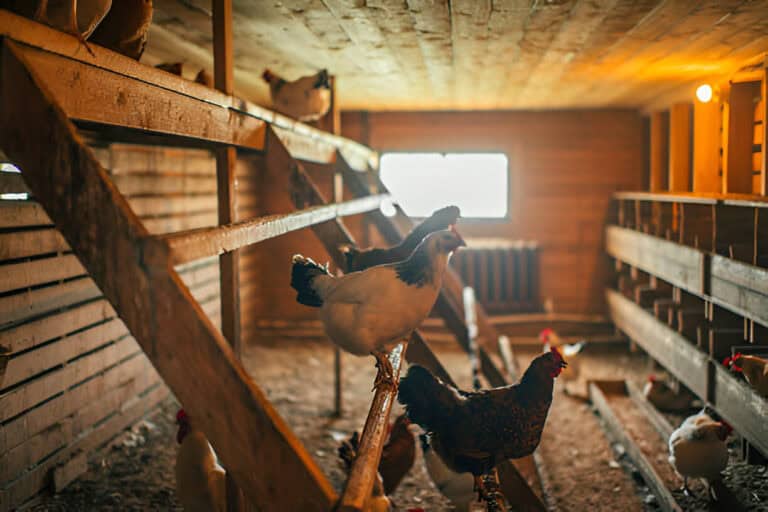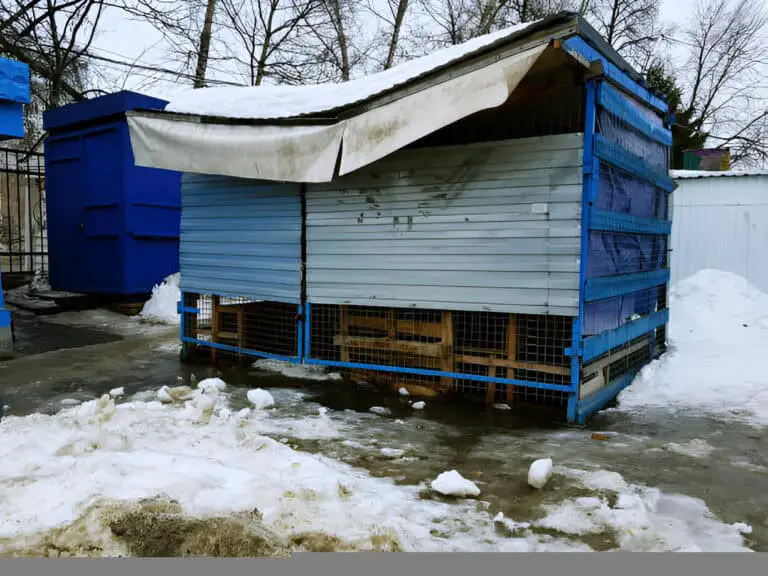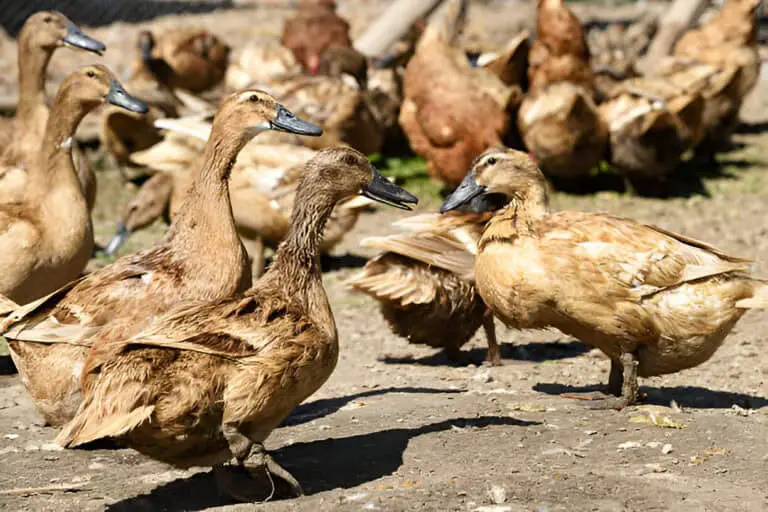Do Free Range Chickens Need Feed? What They Eat & How Much?
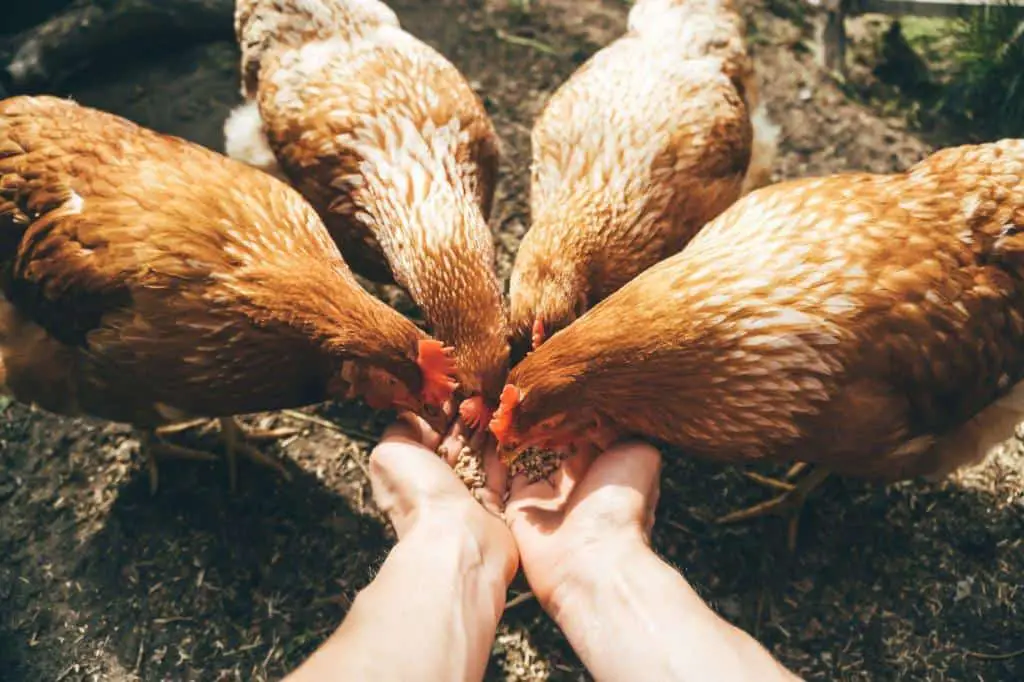
Are you wondering if free-range chickens really need to be fed? Or are they self-sufficient foragers?
The truth is, while free-range chickens do have the ability to forage for food in their natural environment, they still require a consistent source of food and water to maintain their health and productivity.
In this post, we will explore the feeding habits of free range chickens, what they eat, and how much they need to thrive. By the end of this article, you’ll have a good understanding of why your free range chickens need feed and how to go about providing them with it.
What Are Free Range Chickens?
Free range chickens as per definition are chickens that are allowed to roam freely outdoors. They have access to fresh air and the ability to eat a natural diet of grasses, weeds, insects, and other sources of nutrition. Free-range chickens live in an environment that is much closer to their natural habitat than traditional poultry farming methods.
The term “free range” is often used to describe chickens that are allowed to have access to the outdoors, but it’s important to note that there is no legal standard for the use of the term and it can be used to describe different practices.
Some Misconceptions of Free Range Chickens
One of the most common misconceptions is that free range chickens do not need to be fed because they can find food on their own. This is not true as free range chickens still require a balanced diet to maintain their health and productivity.
Another misconception is that free range chickens are free from disease, but that’s also not entirely true. Free range chickens are still exposed to disease risks such as parasites, predators, and environmental factors.
Some folks assume that free-range chicken eggs are always organic, but this is not the case. Free-range eggs can be organic, but they don’t have to be. Organic eggs come from poultry that is raised according to certain standards, but free-range chicken eggs can be produced by chickens that are not raised according to organic standards.
Do Free Range Chickens Need Feed?
As mentioned above, there is a common misunderstanding that these birds do not need to be fed because they can forage for food on their own. However, this is not entirely true.
While free range chickens have the ability to forage for food in their natural environment, supplementing their diet with feed is needed to ensure that they are receiving all the necessary nutrients. Feed can give chickens a steady source of the protein, energy, vitamins, and minerals they need to stay healthy and keep laying eggs.
A balanced diet is needed for the health and well-being of free range chickens. If you feed chickens a diet that doesn’t have enough of certain nutrients, they might not lay as many eggs, lose their feathers, or even die.
What to Feed Free Range Chickens?
There are various types of feed available for free range chickens, including commercial poultry feed, kitchen scraps, and homemade feed mixtures.
- Natural food sources. Free range chickens that raise freely outdoor are able to forage for food in their natural environment. They can find food such as insects, seeds, and greens on their own. However, the availability and diversity of natural food sources can vary depending on the season and location.
- Commercial poultry feed. This type of feed keeps free range chickens healthy without having to rely solely on their natural surroundings. It contains ingredients such as corn, wheat, sorghum and soybean meal to provide energy sources for growth and egg production. It often includes animal byproducts like fish meal or blood meal for additional protein sources.
- Homemade feed mixtures can also be used, but it’s important to ensure that the mixture contains all the necessary nutrients for chickens.
- Supplementing with feed. Supplemental feed can provide a consistent source of protein, energy, and vitamins and minerals that chickens need to maintain their health and egg production.
How Much to Feed Free Range Chickens
Free range chickens have different nutritional needs than chickens that are confined to small spaces. Free range chickens have the ability to forage for food in their natural environment, but they still require a balanced diet to maintain their health and productivity.
One important aspect to consider when feeding free range chickens is the amount of feed they need. The amount of feed required will depend on the type of feed provided, as wll as the age and size of the chickens. Chickens that are younger and smaller will require less feed than older and larger birds.
For commercial poultry feed, the recommended amount to feed free range chickens is about 1/4 to 1/3 pound of feed per chicken per day. This can vary depending on the type of feed and the nutritional needs of the chickens. It’s important to follow the instructions on the feed bag and adjust the amount of feed as necessary.
When it comes to kitchen scraps, be mindful of what kind of scraps you are giving them, as some foods can be harmful to chickens. Kitchen scraps should only be used as a supplement to their diet and not as a replacement for their regular feed.
You can also use homemade feed mixtures, but make sure that they have all the nutrients that chickens need. A good homemade feed mixture should include a source of protein, such as peas, beans, or meat scraps, as well as a source of carbohydrates, such as oats or corn. Also, it’s important to add something that has vitamins and minerals, like crushed eggshells or oyster shells.
Feeding Schedule
It is important to feed free-range chickens on a regular schedule to make sure they get all the nutrients they need. It’s recommended to feed chickens twice a day, in the morning and in the evening.
Chickens tend to be most active in the morning, so it’s best to provide them with their main meal in the morning. In the evening, you can provide them with a smaller amount of feed or scraps to supplement their diet.
Drinking and Providing Clean Water
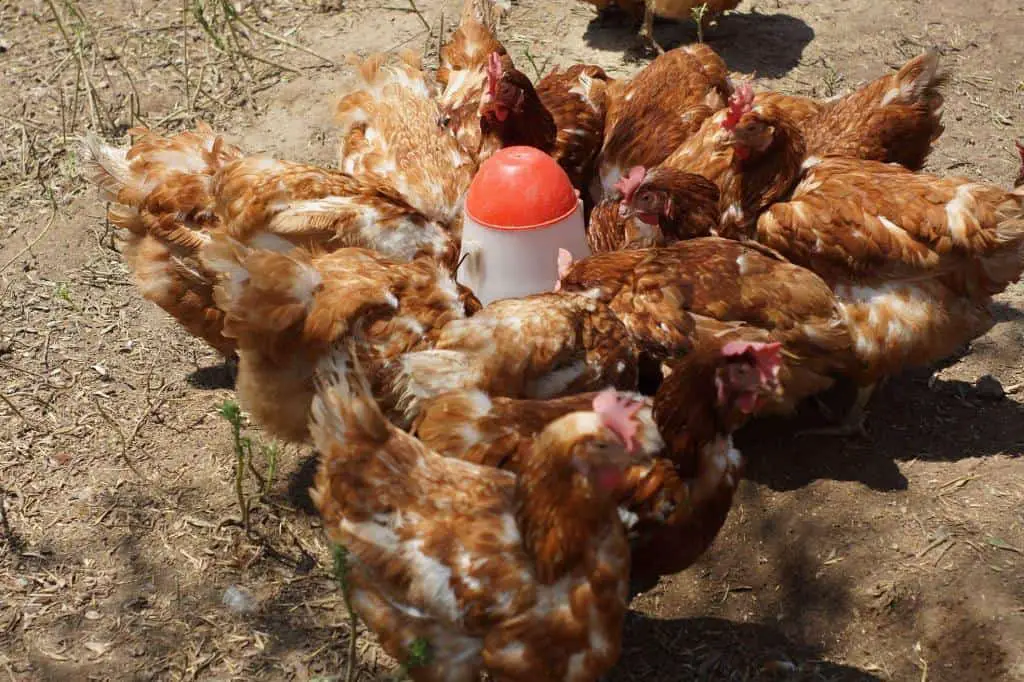
In addition to food, free-range chickens need clean and fresh water for their health and well-being. Chickens need a constant supply of clean water to maintain their health and productivity.
Water should be provided in a clean container and should be refreshed daily. It’s also important to ensure that the water is not too cold, as chickens prefer water that is around room temperature.
How Long Can Free Range Chickens Go Without Feed?
While free range chickens have the ability to forage for food in their natural environment, they still require a consistent source of food and water to maintain their health and productivity.
Typically, chickens won’t survive more than four or five days without their regular diet. This is because chickens need a balanced diet with all the nutrients they need to stay healthy and keep laying eggs.
Without regular food, chickens quickly get weak and can’t find their own food, which makes it much harder for them to stay alive. Chickens should be fed twice a day, in the morning and in the evening, and have access to clean and fresh water at all times.
TIPS
If for any reason you can’t feed your chickens for a day or two, have a backup plan to ensure that the chickens have enough food and water to last for a few days.
Do Free Range Chickens Need Grit?
Free range chickens, like all chickens, need grit in their diet to help them digest their food and maintain their overall health. Grit is a type of small rock or mineral that chickens consume to help grind up their food in their gizzard, which is a part of their digestive system. Chickens use grit to help break down tough plant fibers, seeds, and other hard-to-digest foods.
Many people assume that free range chickens can find enough grit in their natural environment, but this is not always the case. While chickens can find some grit in the ground, it’s not always enough to meet their needs.
Depending on the location, the ground may not be rich in natural grit sources, therefore, it’s important to provide them with additional grit.
Chickens should always have access to grit, even if they are free-ranging. Grit can be provided in a separate container or mixed with their feed. It’s important to note that chicks that are free range will be able to get their grit from the ground like the adult chickens do, so they won’t need additional grit. As they grow and start to eat more adult food, they will need grit to aid digestion.
Do Free Range Chickens Need Worming?
Free range chickens are more likely to come into contact with parasites and worms, as they are able to roam around in their natural environment. These parasites can cause serious health problems, so it’s essential to ensure that free range chickens are regularly wormed.
One of the most common types of worms that chickens can contract is the roundworm. They are more likely to come into contact with roundworm eggs and larvae.
Another type of worm that chickens can contract is the tapeworm. Free range chickens are at a higher risk of contracting tapeworms because they are able to come into contact with infected insects and other animals.
It is recommended that free range chickens be treated for gastrointestinal parasites routinely. Worming should occur at least every 3–6 months, or 2–4 times a year, depending on the location, the weather, and the presence of worms in the environment.
Wormers come in liquid, tablet, or syrup form and can be purchased from major pet stores or online. They can be given to chickens in a variety of ways, including orally, in their feed, or in their water. Also, you should look at your chickens’ poop to see if they have worms and talk to a vet to figure out the best worming schedule for your chickens.
Conclusion
Free-range chickens do need to be fed. Even though they can find food in their natural environment, they still need a steady supply of food and water to stay healthy and productive. It’s important to give them a balanced diet with all the nutrients they need, like commercial poultry feed, leftovers from the kitchen, and homemade feed mixtures.
The frequency and amount of food will depend on the breed and their individual personalities. Chickens should be fed twice a day, in the morning and in the evening, and have access to clean and fresh water at all times.
It is also important to keep track of how much food they eat and change it as needed to make sure they get enough food to stay healthy and productive.

